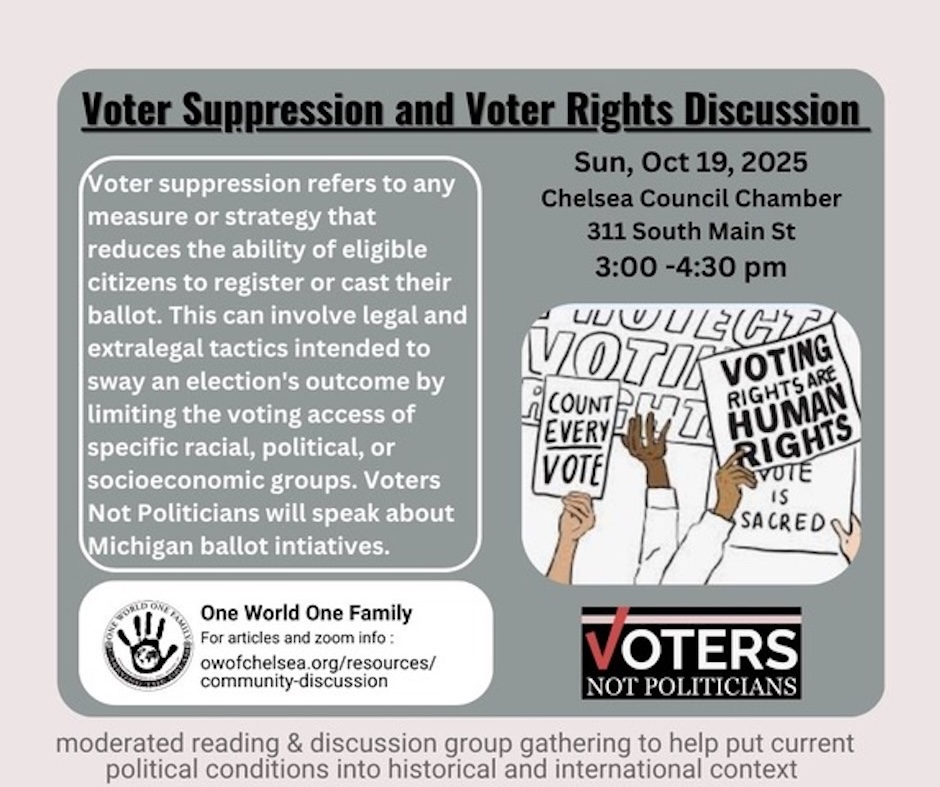
Making Sense of the Unprecedented
Part 5 – Discussion Sunday, October 19 @ 3pm in City Council Chambers (in the Police Dept Bldg).
This 5th session is titled "What to Know About Voter Suppression and Voters Rights.” Voter suppression refers to any measure or strategy that reduces the ability of eligible citizens to register or cast their ballot. Voter suppression can involve legal and also extralegal tactics intended to sway an election’s outcome by limiting voting access, most usually along specific racial, political or socioeconomic groups. We will explore some of this history in our state and nation and look at current ballot initiatives. Carole Murphy from Voters Not Politicians will lead the discussion.
Again, the readings are from current publications. Please review the articles and videos below.
Voters Not Politicians – Current Ballot issues
Fact-checking regarding mail-in ballots and voting machines
Voting Rights – List of Laws and Amendments (PDF)
Review of Efforts to Challenge Voter ID and Purging Voter Roles (PDF)
The Past, Present & Future – The History of the Voting Rights Act and what we can do (Video)
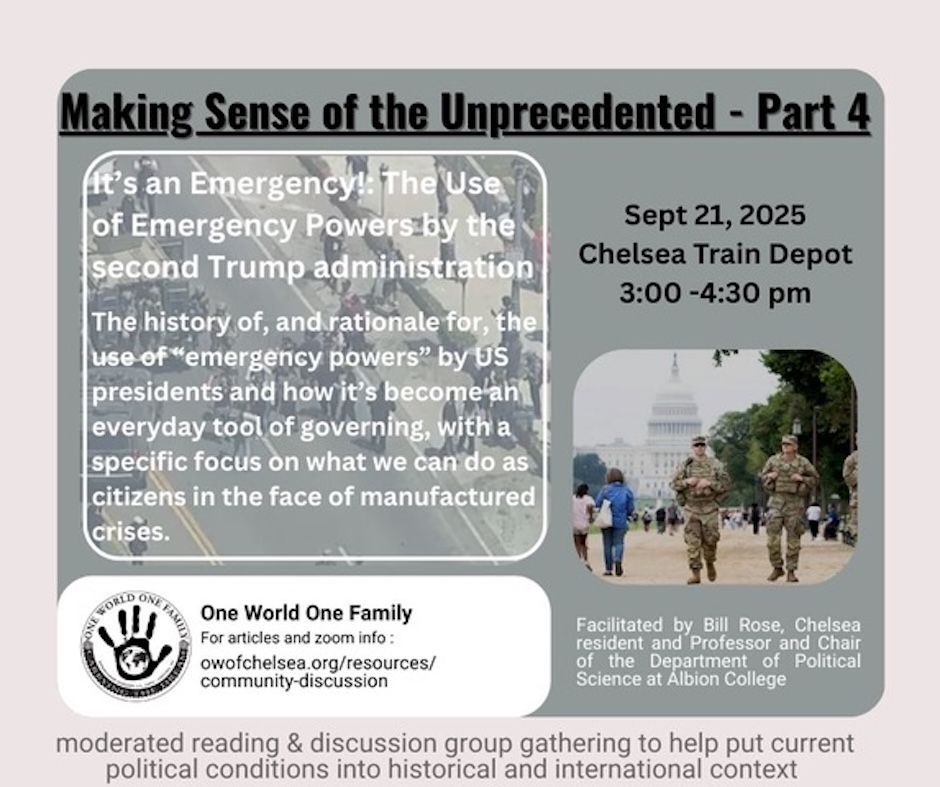
Making Sense of the Unprecedented
Part 4 – Discussion Sunday, September 21@ 3pm at the Chelsea Depot, 125 Jackson St. Chelsea, 48118. We’ll be on the west side.
This fourth session is titled "It’s an Emergency! The Use of Emergency Powers by the second Trump administration.” We will read about the history of and rationale for the use of “emergency powers” by US presidents. Readings also show specifically how Donald Trump has turned emergency powers into an everyday tool of governing. Discussion will also focus on specific examples and what we can do as citizens in the face of manufactured crises.
The readings are timely and consist of the articles and videos below.
These pieces help us understand the sheer magnitude of the issue at hand: many presidents have asserted emergency powers before, but none to the extent that Donald Trump has. Further analysis explains the uses and abuses of this power and provide a fair-minded treatment of what can be a complex issue for both sides of the aisle. Finally, we hope to discuss a framework to begin to turn concerns into calls for reform.
The discussion will be facilitated by Bill Rose, Chelsea resident and Professor and Chair of the Department of Political Science at Albion College.
Readings (in order of importance):
1.) NYT, "How Trump Used 10 Emergency Declarations to Justify Hundreds of Actions"
This is a very carefully constructed and useful interactive piece by the Times staff that helps us understand the sheer magnitude of the issue at hand: many presidents have asserted emergency powers before, but none to the extent that Donald Trump has, in just a little more than 6 months into his second term in office. It will be helpful for many of us to read this piece first.
2.) Elizabeth Goitein, "The Alarming Scope of the President's Emergency Powers"
Goitein is senior director of the Brennan Center's Liberty and National Security Program, and has been at the forefront of a public-facing national call to attention regarding the presidential use and abuse of emergency powers. Although this piece was written in reference to Trump's first term, the analysis is still quite relevant for the actions of Trump II
3.) Chachko and Linos, "Emergency Powers for Good"
In light of their profligate use by the current administration, we might be justified in challenging any use of emergency powers. Chachko and Linos's essay is helpful in blunting that tendency; they provide a fair-minded treatment of the many complexities that attend to this issue
Both are lawyers - Bauer was formerly White House Counsel from 2010-11 - and their recommendations reflect their training and intellectual orientation. Nonetheless, their discussion provides a useful framework to begin to think how we might channel our concerns into more effective calls for reform
A “balanced” discussion that includes a summary, warnings for both sides of the aisle and additional suggestions for reform.
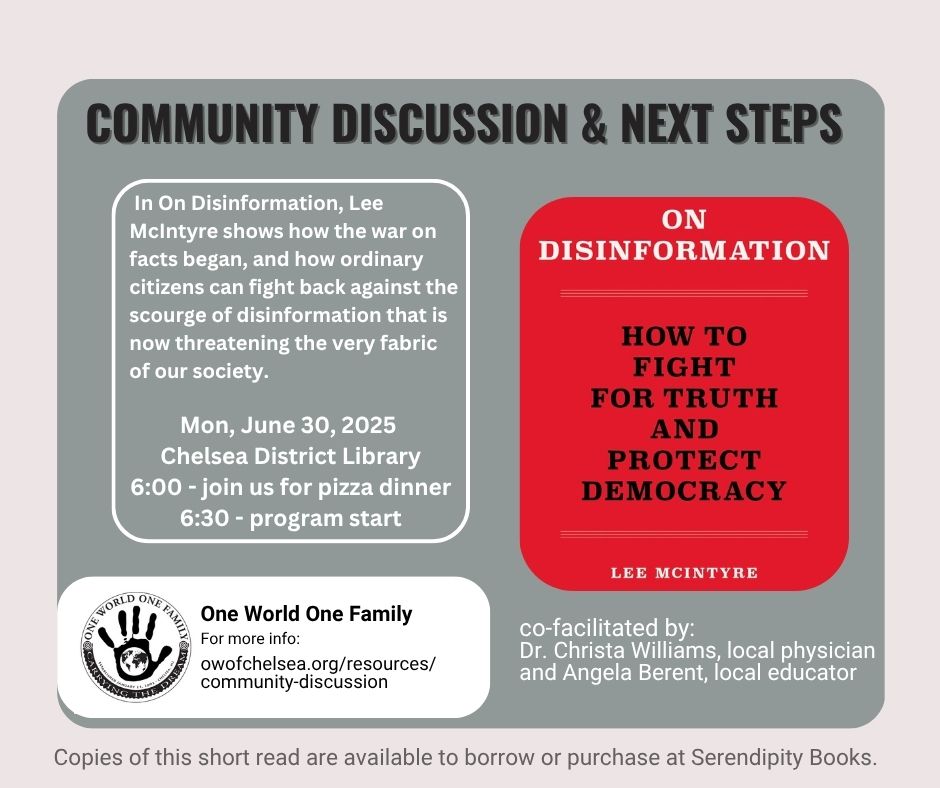
Making Sense of the Unprecedented
Part 3 – Discussion Monday, June 30, 6.30-7.45pm, McKune Room - Chelsea District Library Convene at 6pm. Discussion starts promptly at 6.30. For those in person, we will have pizza or bring a snack.
Copies of the book are available to borrow or purchase at Serendipity Books. To borrow a book, please ask at the counter. It is not a long book so sharing copies is encouraged.
Zoom: https://us02web.zoom.us/j/87051028274?pwd=L5p4ZwpXDZRmUE6J1x8iTIQV4sfPP7.1
Meeting ID: 870 5102 8274
Passcode: 465425
This third session will review On Disinformation: How to Fight For Truth and Protect Democracy, by Lee McIntyre.
In this session, we will address the rampant lying and “alternate facts” we face every day. The effort to destroy facts and sow distrust didn't come out of nowhere. It is the culmination of seventy years of strategic denialism. In On Disinformation, Lee McIntyre shows how the war on facts began, and how ordinary citizens can fight back against the scourge of disinformation that is now threatening the very fabric of our society. On Disinformation lays out ten everyday practical steps that we can take as ordinary citizens-from resisting polarization to pressuring our Congress people to regulate social media-as well as the important steps our leaders must take.
The discussion will be co-facilitated by Dr. Christa Williams, a local physician, and Angela Barent, a local educator.
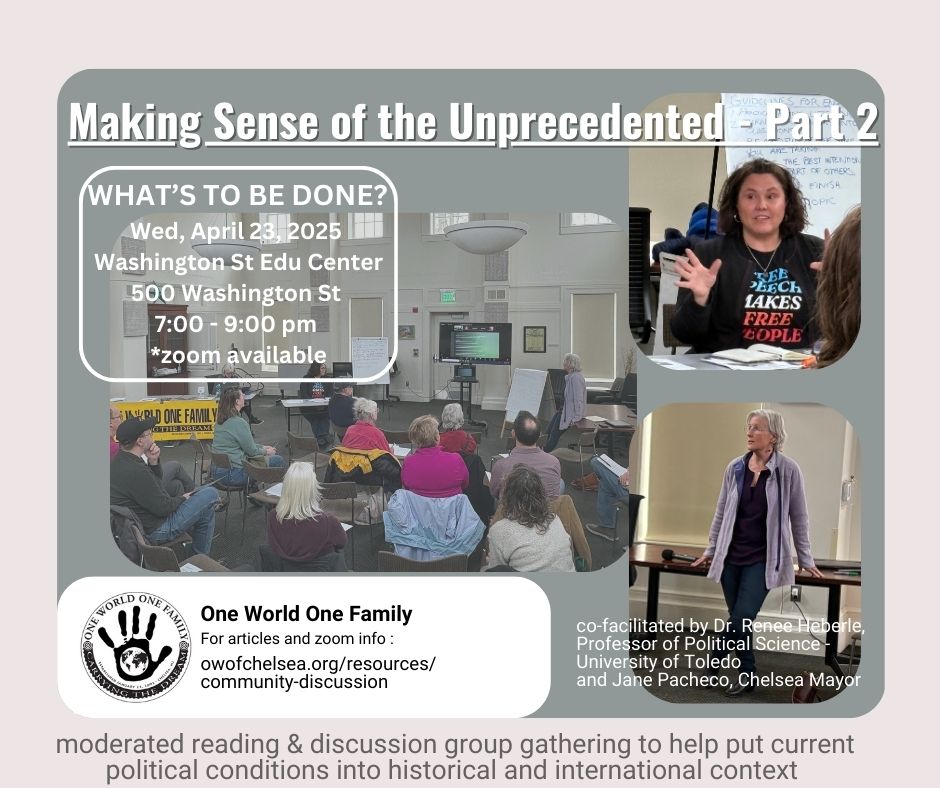
Making Sense of the Unprecedented
Part 2 – Discussion Wednesday, April 23, 7-8.30pm, The Board Room at the Washington Street Education Center (WSEC).
Zoom: https://us02web.zoom.us/j/87051028274?pwd=L5p4ZwpXDZRmUE6J1x8iTIQV4sfPP7.1
Meeting ID: 870 5102 8274
Passcode: 465425
Previously we discussed what makes an autocracy and looked at illiberal values and their role. This time we focus on the rapid transformation of government entities that now impact (and will impact further) our community. The articles we will discuss at this session include an article by Bonnie Honig that discusses the value of "public things" - namely the value beyond the monetary. The article by Steven Robinson describes a community pulling together to protect itself from a project that threatened their "public things". The article by Scheiring, formerly a member of the Hungarian Parliament, outlines the steps Orban has taken to destroy the democratic state but suggests what he says it takes to undo that destruction of institutions held in public trust.
We’ll explore what do we, as a community, consider public goods? Can we, through considering what author Bonnie Honig calls "public things", define what it is we want to fight to preserve? Do we have the will and tenacity to construct a resistance like that described by Robinson?
The discussion will be co-facilitated by Dr. Renee Heberle and Jane Pacheco. Renee is a Professor of Political Science at the University of Toledo and Jane is the Mayor of Chelsea.
Articles to be discussed in April:
(1) The Politics of Public Things (PDF)
(2) Turf War (PDF)
(3) I Watched Orban Destroy Hungary’s Democracy. Here’s my advice… (use link below) https://www.politico.com/news/magazine/2024/11/23/trump-autocrat-elections-00191281
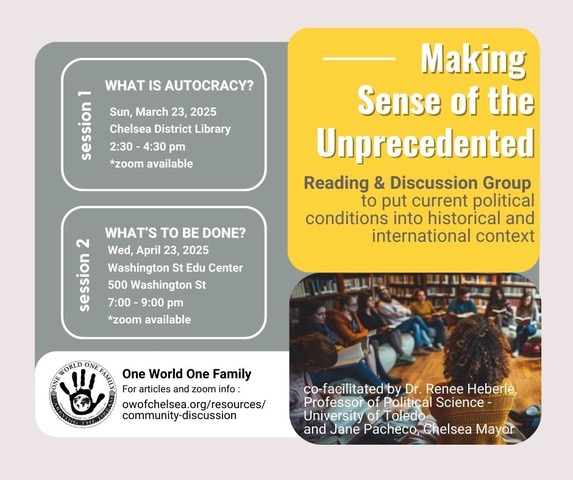
Making Sense of the Unprecedented
Discussion group Sunday, March 23, 2.30pm McKune Room, Chelsea District Library
Topic: Community Discussion re Autocracy
Join Zoom Meeting
https://us02web.zoom.us/j/87051028274?pwd=L5p4ZwpXDZRmUE6J1x8iTIQV4sfPP7.1
Meeting ID: 870 5102 8274
Passcode: 465425
Join OWOF for discussions that will put current political conditions in the United States into historical and international context. We will discuss articles that will help us make sense of what is an unprecedented and disorienting time in a country we want to think is guided by liberal values of checked power, the dignity of individuals, and self-governance.
Questions we will raise include: What kind of political rule is autocracy? Is the US becoming autocratic? How have contemporary rulers such as Vladimir Putin of Russia and Viktor Orban of Hungary transformed their systems of government into autocracies? What differences exist in the US system that will inhibit and/or enhance the possibility of the US becoming autocratic?
The discussion will be co-facilitated by Dr. Renee Heberle and Jane Pacheco. Renee is a Professor of Political Science at the University of Toledo and Jane is the Mayor of Chelsea.
Discussion of these articles in March will be followed by a discussion in April about how citizens have taken action to resist illiberal attacks on their systems of government.
Articles to be discussed in March:
Autocratic Legalism (PDF)
The Path to American Authoritarianism (PDF)
The Nature of Our Power
Optional readings:
Hungary's Viktor Orban
Living in an Endangered Democracy
Trump Autocrat Elections









